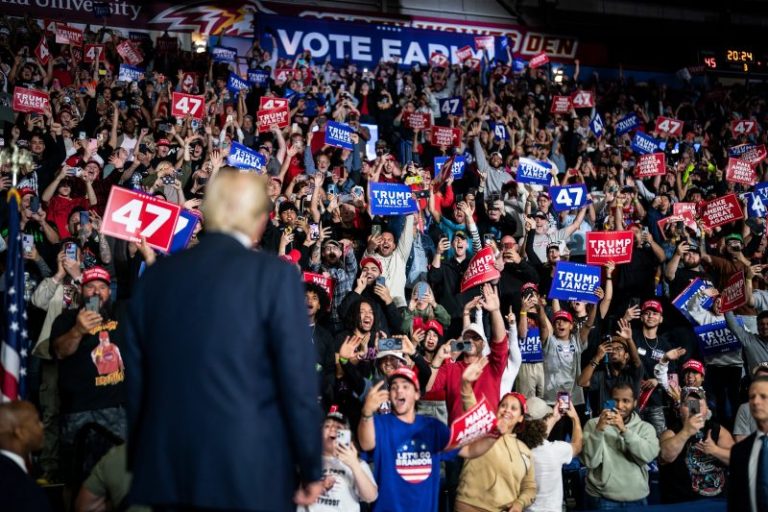Former president Donald Trump on Thursday proposed new tax incentives and trade protections aimed at bolstering the U.S. car industry, as he battles Vice President Kamala Harris for crucial votes in the industrial Midwest.
Ahead of a speech at the Economic Club of Detroit, Trump’s campaign announced support for new tax breaks on car loans, expanded tax incentives for U.S.-based car manufacturers and higher tariffs on foreign automobile imports. These proposals come on top of the more than $7 trillion in tax cuts already promised by Trump during the 2024 presidential campaign, which the GOP presidential nominee has not explained how he would pay for.
The pledges reflect the intensifying battle in this November’s presidential election over the upper Midwest and its crucial Electoral College votes. In September, during a speech in Pittsburgh, Harris proposed her own tax incentives aimed at bolstering advanced manufacturing. President Joe Biden has also already aggressively defended U.S. car producers from Chinese electric vehicle imports, although Trump has said he will go even further in erecting new trade barriers.
Despite Trump’s pledges to revive Detroit’s automakers, analysts pointed out that the former president is simultaneously vowing to repeal subsidies approved by Democrats for electric vehicle production as part of their 2022 Inflation Reduction Act. Virtually all U.S. car producers have been moving toward EVs and hybrid vehicles, and repealing those federal incentives would slow progress toward the industry’s future even if Trump implemented his newly proposed tax breaks.
“There’s a contradiction: You can’t go away from EVs while saying you’re going to save the industry. The industry is going to EVs anyway,” said Erin Keating, an analyst at Cox Automotives. “It’s very telling EVs are nowhere to be mentioned here when every company is moving toward them — that is still the long-term product line.”
Brian Riedl, senior fellow at the Manhattan Institute, a center-right think tank, also pointed out that Trump has vowed special tax breaks to a huge range of constituencies in the final stretch of the presidential campaign, including seniors on Social Security, workers who rely on tips, Americans living abroad and more.
“My first reaction is the Trump campaign seems to be throwing darts at the dartboard for any random populist giveaway for voters without any regard of economic need, coherence or sustainability,” Riedl said.
Trump has accused China of building auto plants in Mexico to sell into U.S. markets, vowing to revoke the trade deal he negotiated with Mexico and Canada should that effort continue. White House National Economic Council Director Lael Brainard also expressed concern in a speech in Detroit last month about foreign “entities of concern” becoming involved in North American auto supply chains.
“You can make the auto industry thrive, bring it back to where it was 50, 60 years ago,” Trump said in his speech Thursday. “And I’m laying out a policy that will absolutely do it in my opinion … My goal is to see U.S. auto manufacturing even greater than it was in its prime, and for Detroit and Michigan to be at the center of the action.”
Harris spokesperson Ian Sams responded to the new proposal by saying Trump was copying Harris, who recently called for revisiting Trump’s trade deal with Canada and Mexico amid concerns over Chinese auto imports to the United States.
After Biden won Michigan closely four years ago, Trump and Harris are neck-in-neck polling in the Rust Belt states. Harris leads in Michigan by two points, according to The Washington Post polling average.
Both candidates have argued they would shore up Michigan’s struggling auto industry. Republicans have warned that the Democratic ticket would mandate the end of gas-powered cars, which Harris has denied. Meanwhile, the Harris campaign has emphasized the Biden administration’s investments in the auto industry, most recently attacking his running mate JD Vance for refusing to say if a Trump White House would maintain a $500 million federal grant to General Motors for an electric vehicle factory in Lansing.
The United Auto Workers, which endorsed Harris, knocked Vance and Trump for their promises to repeal investments from the Inflation Reduction Act. In a media call ahead of Trump’s speech, union leader Shawn Fain said Trump’s economic plan would lead to further plant closures.
“Kamala Harris has an agenda that will invest directly in workers with more training, more plants and more jobs, and our members aren’t going to be fooled by what Donald Trump says in Michigan today or any other day, with our livelihoods on the line this November,” Fain said.
Trump’s plan for the auto industry included new tax incentives for research and development, including manufacturing investments and heavy machinery. The Trump plan also called for allowing Americans to deduct the interest on their car loans, similar to how mortgage interest payments are currently deductible.
But it’s unclear how impactful these plans would be. Very few Americans still itemize their tax returns, in part because Trump’s tax cut doubled the standard deduction, said Keating, the Cox Automotives analyst. “If Trump’s ultimate goal was to save the auto production business in the U.S., none of these assure we start producing more vehicles,” Keating said.



